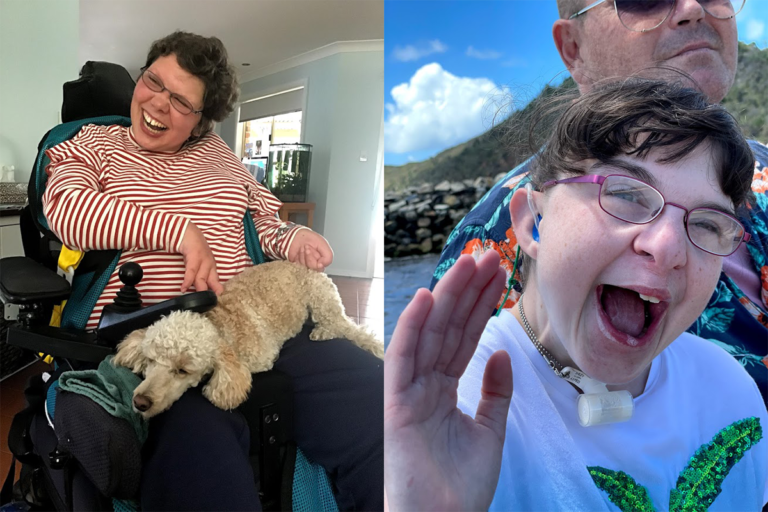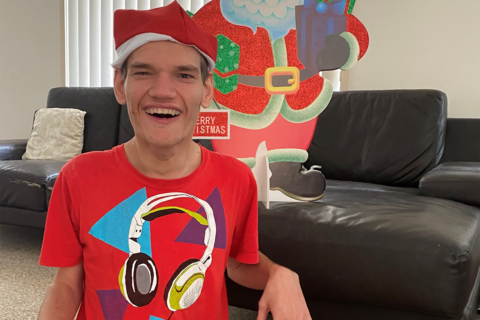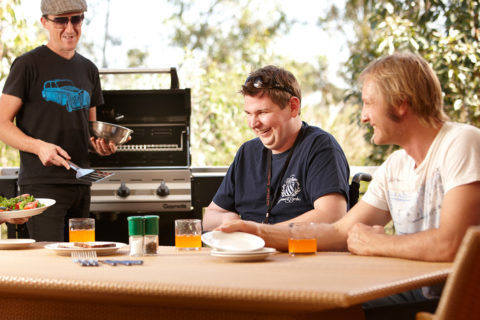![]()
Tamarrah and Summah’s Story
Jenny has fostered children for 45 years; over this time, she has taken on children long term, short term and in emergency situations. But one thing all of her foster children have in common is that they all are disabled.
Jenny was asked if she could foster one of her girls, Tamarrah, for the weekend. She was only 15 months old at the time, and now 27 years later, the family joke that they are still waiting for someone to come and pick her up. Even though she can only move two fingers and she is very dependent on support, Jenny explained how she has always partaken in everything; from art, to horse-leading, Tamarrah is a social butterfly.
“When she came to us, we were told she would probably die by the time she was two or three. She was a bit of a mess the poor little thing, but we thought no, let’s see what we can do. We started on a big program of physio and occupational therapy and really good nutrition. By the time she was five, you could see a massive improvement in her and it really started to look as though she might have a future.”
Summah (23) was an incredibly sick baby and spent the first two years of her life in intensive care, before being transferred into a children’s home for the terminally ill. No one thought she would live, but she defied the odds and eventually they thought it was time to finally try and find Summah a home.
“It wasn’t easy to find a family, but we were lucky enough to be found and she came home to us when she was four years old. It didn’t take us long to realise she was almost blind and profoundly deaf, which no one had ever helped her with.”
The family insist that the girls play an integral role in the community; the enrolled the girls in mainstream school, extra-curricular activities and have always encouraged them to be active members of society.
“If you’d ever seen Summah doing karate, or ballet or violin…! But I figured if that’s what the rest of her friends were doing, so that’s what she was doing. It was the same with the rest of the girls. We didn’t care if they’re the worse in the class, or if they come last at Little Athletics. That’s not what is important, it’s being part of things that’s important.”
Currently, the couple have seven foster children; four of whom live at home – including Tamarrah and Summah, two who are married and one that has sadly passed away. Three of the girls at home have high support needs and will likely stay at home, with Jenny forever.
“They’re absolutely our treasures, I cannot tell you the joy they give us. We feel so privileged to have raised them. I must admit though, lack of space [in the house] is a big thing.”
With the wheelchairs, medical equipment and supplies for the girls, the lack of space in the house has become a challenge for the family. The girls, who are now young women, crave their own personal space as well as room to do their therapies and hobbies. Marj and Jenny also need their own space occasionally, as well as storage space for the supplies that they buy for the girls.
During COVID, the family found that moving to independent activities at home worked even better for the girls. The only downside of this was that the already crowded house had even more people in it at any given time, and with limited room for activities, the one shared space could not handle the amount of activities long term.
“Other people take those things for granted, you don’t stop to think about it. But having that extra space will make a huge difference,” Jenny explained
“I would move heaven and earth to keep them at home. This is their home; we would never want them to be anywhere else. It’s everything to us. All of us need to feel like we have roots and we belong somewhere and these girls are no different to any of the rest of us.”
To help them out, Youngcare provided the family with a grant for home modifications to convert the garage space into an extra room. This will allow the girls to continue to pursue their hobbies, therapies and have some extra personal space for leisure activities, as well as an appropriate and safe storage space for their medical equipment.
This grant has come at an important time for Jenny, a time where external support has been imperative for the family to get through a very difficult time.
“When the girls got their NDIS plans earlier this year, I was diagnosed with cancer. I had to undergo surgery, then chemo and now radiation. Being able to have that wonderful team of people for back up is just fabulous. I don’t know how we would have gotten through this last year without that, they have been amazing, they have stepped in wherever they have been needed.
When I got diagnosed, I had to take a cold hard look at what would happen if I died. It’s not an easy thing to be confronted with but as you get older you have to think about it because you have to plan for them, and how they’re going to manage.
Our absolute priority was that the girls would stay here in this house. This is their home, it’s the only home they’ve ever known and we didn’t see why that couldn’t continue.”
When it comes to charitable giving and community support, Jenny has always ensured that their girls are well educated and understand the importance of giving back.
















